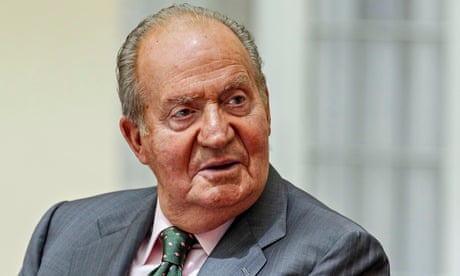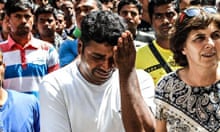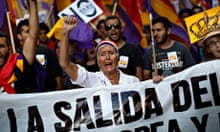The former Spanish king, Juan Carlos, is facing the first serious legal challenge since his abdication in June, as Spain's supreme court considers whether it will hear a paternity suit lodged by a Spanish waiter.
Adopted as a child, Alberto Solà Jiménez, 58, claims that his biological mother, who belonged to a prominent Catalan banking family, had a relationship with Juan Carlos before he became king.
Solà Jiménez's first attempt to lodge a paternity suit in 2012 was dismissed by a judge who noted that Spain's 1978 constitution granted full immunity from legal proceedings to the head of state.
Solà Jiménez went back to the courts the following year and the same criteria was used by another judge to reject the claim. The head of state, said the judge at the time, "lies beyond the reach of any kind of action directed against his person". Solà Jiménez appealed the decision, leaving the paternity suit pending.
The legal challenge landed in Spain's supreme court on Tuesday as a consequence of Juan Carlos's abdication in June. When the ageing monarch handed over the throne to his son Felipe, he lost the full immunity he had enjoyed during his 39-year reign.
Days after the handover, the conservative People's party scrambled to pass legislation to protect Juan Carlos legally. The resulting law was "reasonable, fair and sensible," said the prime minister, Mariano Rajoy, explaining why his party used their majority to rush the legislation through parliament. Analysts suggested it was motivated in part by the threat of paternity suits filed by Solà Jiménez and a Belgian, Ingrid Jeanne Satiau, who also claims that Juan Carlos is her father.
Unlike his previous immunity, the new legislation does not completely shield the ageing king. Juan Carlos must answer to the supreme court, in a similar type of protection afforded to many high-ranking civil servants and politicians in Spain.
The legislation stipulates that all outstanding legal matters relating to the former king be suspended and passed "immediately" to the supreme court. Solà Jiménez's appeal was one of the matters passed along.
The supreme court must now pronounce on how the question of immunity will apply to the former head of state, whether it will be extended to personal matters and whether the former king will be shielded from the law for the periods before and after he was king.
Francesc Bueno Celdrán, the lawyer representing Solà Jiménez, said it was likely to be months before he and his client receive any indication how the court would lean. "If it's positive, it means the king will have to take DNA tests," he noted.
However, he had little expectation that the court would hear the case. "There are many personal interests at play that suggest it won't do well," he said. If the paternity suit is dismissed, he and his client are planning to appeal before the European Court of Human Rights in Strasbourg. The royal household declined to comment on the matter.
Juan Carlos is far from the only member of the Spanish royal family under legal scrutiny. Last month a court upheld corruption charges against Princess Cristina, the youngest daughter of Juan Carlos, paving the way for an unprecedented criminal trial. She is under investigation for possible tax fraud and money laundering, while her husband Iñaki Urdangarin faces charges for fraud, falsifying documents and embezzlement. Both have denied any wrongdoing.










Comments (…)
Sign in or create your Guardian account to join the discussion